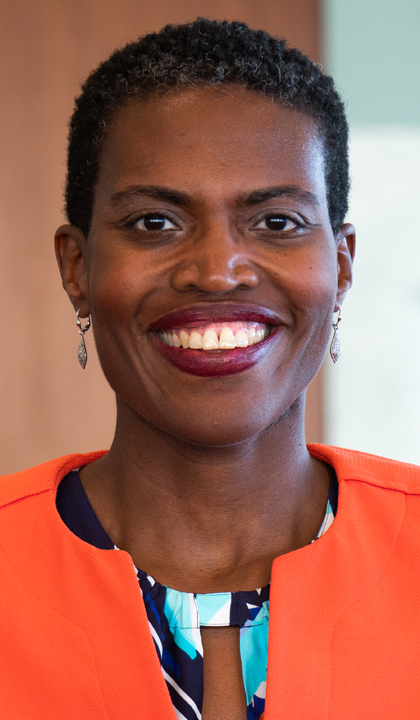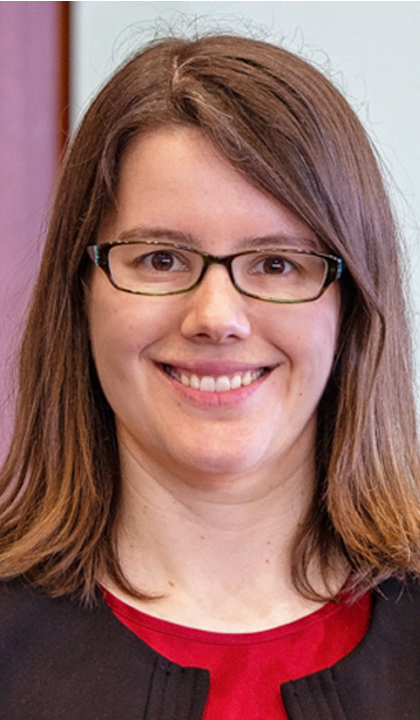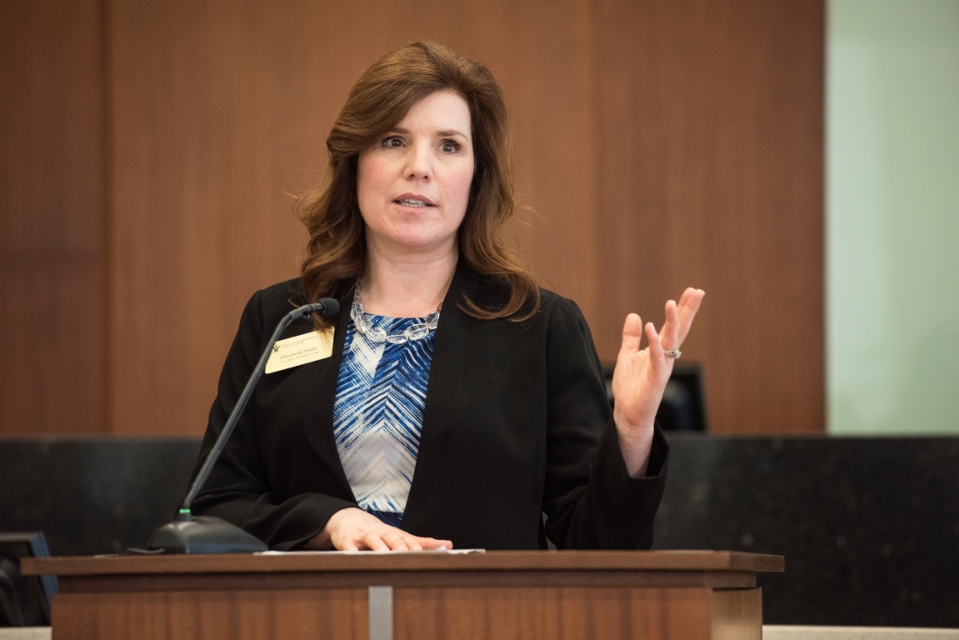Judged a Leader in Health Law by a Jury of Our Peers
For nearly 40 years, nationally renowned faculty at Saint Louis University School of Law's Center for Health Law Studies have provided leadership in health law scholarship, education and research. The Center has been named the best in the nation by health law scholars for the 15th year, according to the 2020 U.S. News & World Report Best Graduate School rankings. Below is a sampling of their expertise >
Racial and Gender Equity in Today's Climate with Ruqaiijah Yearby
 Professor Ruqaiijah Yearby specializes in racial disparities in health, the political economy of health care
and social justice in medical research. In this episode of the SLU LAW Summations podcast, Yearby discussed racial and gender equity in health care, the workplace and our
government. Yearby joined SLU LAW in July of 2018. She is a nationally and internationally recognized scholar, a prolific writer and
frequent presenter.
Professor Ruqaiijah Yearby specializes in racial disparities in health, the political economy of health care
and social justice in medical research. In this episode of the SLU LAW Summations podcast, Yearby discussed racial and gender equity in health care, the workplace and our
government. Yearby joined SLU LAW in July of 2018. She is a nationally and internationally recognized scholar, a prolific writer and
frequent presenter.
Navigating the Breakthroughs in Healthcare Innovation
 New technologies in healthcare are developed at a rapid pace with legal standards
and the FDA often left playing catch up. In this episode of SLU LAW Summations, we are joined by Professor Ana Santos Rutschman who discusses everything from artificial
intelligence to blockchain technology and nanorobot and how regulating the industry
can be an ever-changing challenge. In this episode, we are joined by one of the newest
members of the SLU LAW faculty,
New technologies in healthcare are developed at a rapid pace with legal standards
and the FDA often left playing catch up. In this episode of SLU LAW Summations, we are joined by Professor Ana Santos Rutschman who discusses everything from artificial
intelligence to blockchain technology and nanorobot and how regulating the industry
can be an ever-changing challenge. In this episode, we are joined by one of the newest
members of the SLU LAW faculty,
Professor Ana Santos Rutschman is an expert in biotechnology. She teaches and writes in the areas of health law, intellectual property, innovations in life sciences and law and technology. Her expertise lies in the intersection of law and innovation policy. Her primary research and teaching interests include health law, intellectual property, and regulation in the life sciences. She has also worked and written on emerging biotechnologies, biobanking, artificial intelligence, and e-health. Santos Rutschman has spoken on these topics in conferences and panels around the world. In 2015-16, she consulted for the World Health Organization on the development of the Ebola and Zika vaccines. She joined the SLU LAW faculty in 2018.
Professor Elizabeth Pendo Awarded a Greenwall Foundation Grant As Part of Collaborative Team.
 The Greenwall Foundation has awarded the grant to support an innovative team project
focused on the disciplinary practices of State Medical Boards (SMBs). Professor Pendo
will work directly with the team, which is led by the Bioethics Research Center.
The Greenwall Foundation has awarded the grant to support an innovative team project
focused on the disciplinary practices of State Medical Boards (SMBs). Professor Pendo
will work directly with the team, which is led by the Bioethics Research Center.
Professor Pendo is a specialist in disability law, bioethics and the law, and health law and policy. Her work advocates for greater access to adequate health care, health insurance, work opportunities, integration in the community, and full participation in society for people with disabilities. Her scholarship focuses on the difference disability makes in places in our society such as the health care system and the workplace, with a particular interest in legal and social meanings of disability.
SLU LAW Researchers Receive Grant to Evaluate the Effects of Racial Equity Tools on Policy
A group of Saint Louis University professors has received a prestigious grant from the Robert Wood Johnson Foundation’s Policies for Action program to evaluate the effects of racial equity and social justice initiatives on policy nationwide.
Spearheaded by principal investigators Ruqaiijah Yearby, J.D., M.P.H., and Sidney D. Watson, J.D., the Jane and Bruce Robert Professor of Law, both of the Center for Health Law Studies, SLU’s research team will work with the developers of these equity tools to identify characteristics of the cities and counties that have adopted the tools and assess their stages of readiness for changes in law and policy.
Our research seeks to identify promising new policies that cities and counties can use to dismantle neighborhood segregation, increase employment options, and improve childhood education for people of color. For a decade, I and others at SLU have researched how better access to Medicaid and private health insurance can improve the health of all Americans, but especially minority Americans. With this research, we are broadening our scope and looking at how policies that relate to housing, employment and childhood education can also improve health.
Sidney Watson, the Jane and Bruce Robert Professor of Law